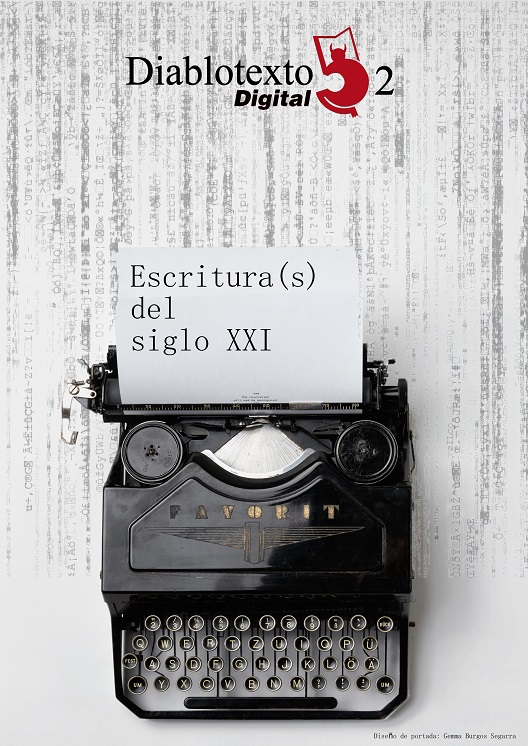Desperate attempts to speak silence: fiction as an instrument for mourning
DOI:
https://doi.org/10.7203/diablotexto.2.10173Keywords:
mourning, Holocaust, novel, historical memory, fiction Abstract
Abstract
We propose an analysis of El comprador de aniversarios (2002) by Adolfo García Ortega, published at the beginning of the memory boom in Spain, as a posttraumatic narrative of mourning. We single out the novel from among other contemporary novel son the Spanish Civil War for its way of approaching the past, its use of fiction and for its subject. We draw parallels that exist between the novel and Dora Bruder (1997) by Patrick Modiano, which could have influenced García Ortega’s. The result of this mourning narrative is another way of understanding our relation in the present with (an)other violent past(s).
 Downloads
Downloads
 References
References
AGAMBEN, Giorgio (2000 [1999]): Lo que queda de Auschwitz. Valencia: Pre-textos.
AVELAR, Idelber (1999). “Restitution and Mourning in Latin American Postdictatorship”. Boundary 2. Vol. 26, N.º 3, pp. 201-224.
BAER, Alejandro (2015). “Ghosts of the Holocaust in Franco’s mass graves: Cosmopolitan memories and the politics of ‘never again’”. Memory Studies. Vol. 8. N.º 3, pp. 328-344. http://dx.doi.org/10.1177/1750698014568247
BECERRA MAYOR, David (2015). La guerra civil como moda literaria. Madrid: Clavel Intelectual.
BRISLEY, Lucy (2013). “The Will to Remember: Problematizing the Ethico-Politics of Mourning and Melancholia”. The International Journal of Civic, Political, and Community Studies, Vol. 10, pp. 61-72.
COOKE, Dervila (2005). Present Pasts. Patrick Modiano’s (Auto)biographical Fictions. New York: Rodopi.
COZARINKSY, Edgardo (2017). “La audacia de dos espírtus apátridas”, Clarín, 23-03-2017, en https://www.clarin.com/revista-n/literatura/audacia-espiritus-apatridas_ 0_ BJ8gBl1he.amp.html [Fecha de consulta: 24 de abril de 2017].
CLEWELL, Tammy (2009). Mourning, Modernism, Postmodernism. New York: Palgrave MACMILLAN.
DERRIDA, Jacques (2001). The Work of Mourning. Chicago: The University of Chicago Press.
EAGLESTONE, Robert (2004). The Holocaust and the Postmodern. New York: Oxford University Press.
ENG, David L. y HAN, Shinhee. “A Dialogue on Racial Melancholia.” En
ENG, David L. y KAZANJIAN, David (eds), Loss: The Politics of Mourning. Berkeley: University of California Press, pp. 343-371.
FABER, Sebastiaan (2012). “Raising the Specter of ‘Argentinization’: The Temptation of Spanish Excepctionalism”. Hispanic Issues Online. Vol. 11, 117-136, en https://conservancy.umn.edu/handle/11299/184377 [Fecha de consulta: 28 de abril de 2017].
FABER, Sebastiaan. (2005). “The Price of Peace: Historical Memory in Post-Franco Spain, a Review-Article”. Revista Hispánica Moderna. Vol. 58, N.º 1-2, pp. 205–219.
FELMAN, Shoshana y LAUB, Dori (1992). Testimony. Crises of Witnessing in Literature, Psychoanalysis, and History. New York: Routledge.
GARCÍA ORTEGA, Adolfo [2002] (2008). El comprador de aniversarios. Barcelona: Seix Barral.
GARCÍA ORTEGA, Adolfo (2005). “¿La sumisión como utopía?”, en http://www.adolfogarciaortega.com/galaxia/galaxia_sumision.html [Fecha de consulta: 23 de abril de 2017].
GATTI, Gabriel (2012). Identidades desaparecidas: Peleas por el sentido en el mundo de la desaparición forzada. Buenos Aires: Prometeo Libros.
HACKL, Erich (2001b). “‘El caso Sefarad’ La responsabilidad de escribir sobre personas reales”. Lateral. N.º 81, en http://circulolateral.com/revista/ articulos/081sefarad.htm, [Fecha de consulta: 19/02/2016].
HACKL, Erich (2001a). “‘El caso Sefarad’ Industrias y errores del santo de su señora”. Lateral. N.º 78, en http://circulolateral.com/tema/078ehackl.htm, [Fecha de consulta: 19/02/2016].
HANSEN, Hans Lauge (2012). “Formas de la novela histórica actual”. En La memoria novelada. Bern: Peter Land. 83-103.
HERRERO, Fermín (2010). “En ésas andamos”, El norte de Castilla, 23-01-2010, en http://www.elnortedecastilla.es/20100123/cultura/esas-andamos-20100123.html [Fecha de consulta: 24 de abril de 2017].
LABANYI, Jo (2010). “Doing Things: Emotion, Affect, and Materiality”. Journal of Spanish Cultural Studies. Vol. 11, N.º 3-4, pp. 223-233.
LEVI, Primo [1963] (2001). Trilología de Auschwitz. Barcelona: El Aleph Editores.
MARTÍNEZ RUBIO, José (2015). La formas de la verdad. Investigación, docuficción y memoria en la novela hispánica. Madrid: Anthropos Editorial.
MODIANO, Patrick [1997] (2015). Dora Bruder. Barcelona: Seix Barral.
MORRIS, Alan (2006). “’Avec Klarsfeld contre l’oubli’ Patrick Modiano’s Dora Bruder”. Journal of European Studies. Vol. 36, N.º 3, pp. 269-293. http://dx.doi.org/10.1177/0047244106069046
MUÑOZ MOLINA, Antonio (2003). “La novela del desaparecido”. Letra Internacional. Invierno. 76-77.
NUCKOLS, Anthony (2016). “La novela de duelo frente a la novela de memoria histórica”. Caracol. Vol. 11 (enero-junio), pp. 210-243. http://dx.doi.org/10.11606/issn.2317-9651.v0i11p210-243
ROMEU GUALLART, Luís María (2010). “‘Yo iba a Auschwitz pero ya no.’ El comprador de aniversarios de Adolfo García Ortega y las posibilidades de acercarnos a la Historia desde la (meta)ficción”, Confluenze, Vol. 1, N.º 7, pp. 165-184.
S.A. (2006). “Entrevista con Benjamín Prado”. El País, en http://cultura.elpais.com/cultura/2006/05/17/actualidad/1147878000_1147880084.html [Fecha de consulta: 19/04/2016].
SULEIMAN, Susan (2007). “’Oneself as Another’: Identification and Mourning in Patrick Modiano’s Dora Bruder”. Studies in 20th & 21st Century Literature. Vol. 31, No. 2, pp. 325-350. https://doi.org/10.4148/2334-4415.1656
VICE, Sue (2000). Holocaust Fiction. New York: Routledge.
WHITEHEAD, Anne (2004). Trauma Fiction. Edinburgh: Edinburgh University Press.
Downloads
Published
How to Cite
-
Abstract791
-
PDF (Español)414
Issue
Section
License
Licencia de reconocimiento de Creative Commons “Reconocimiento - No Comercia l- Sin Obra Derivada
Authors who publish with this journal agree to the following items:
The authors will keep their copyright and guarantee the journal the right of first publication of their work, which will be simultaneously subject to the Creative Commons license that allows third parties to share the work indicating its author and its first publication in the journal. The authors may adopt other non-exclusive license agreements to distribute the version of the published work (e.g., depositing it in an institutional telematic file or publishing it in a monographic volume), with an acknowledgment of its initial publication in this journal. The authors are allowed and encouraged to disseminate their work through the Internet (e.g., in institutional telematic archives or on their website) before and during the submission process, which can produce interesting exchanges and increase citations of the published work. (See Effect of Open Access)




